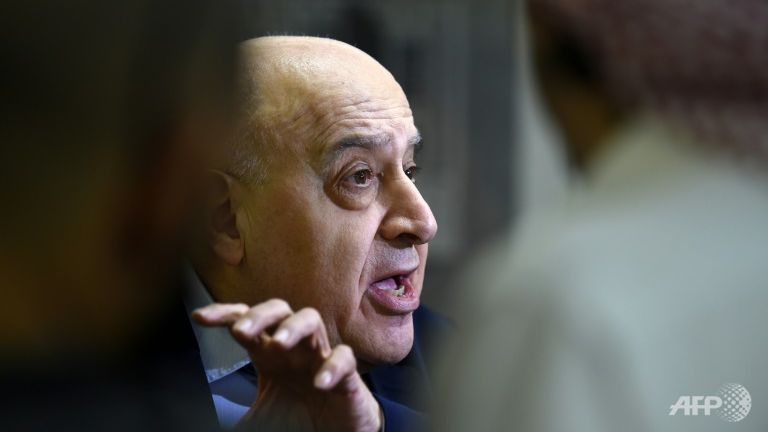Syria opposition meets to decide on peace talks
 |
| Spokesman for the Syrian High Negotiations Committee (HNC), Monzer Makhous (pictured in December), told AFP the talks in Riyadh could last "perhaps all day". (Photo: AFP/Fayez Nureldine) |
RIYADH: The Saudi-backed Syrian opposition met on Wednesday (Jan 27) to decide whether to attend UN peace talks, as wrangling over who will go threatens to derail the biggest push yet to resolve the country's war.
Members of the so-called High Negotiations Committee - formed in Riyadh last month in an effort to unite Syria's fractious opposition - met in the Saudi capital for a second day on whether to accept a UN invitation to the talks due to start Friday.
The Committee insists it must be the sole opposition delegation at the talks in Geneva and is asking for "clarifications" after the UN issued invitations to other regime opponents.
The negotiations were already delayed from Monday over the issue of who will represent the myriad forces opposing President Bashar al-Assad in Syria's nearly five-year civil war.
Committee spokesman Monzer Makhous told AFP the talks had resumed and could last all day but refused to comment further.
Diplomats, including US Secretary of State John Kerry who met with Committee members at the weekend, have piled pressure on the opposition to attend.
The talks are part of a UN-backed plan agreed by top diplomats last year in Vienna that envisages negotiations, followed by the creation of a transitional government, a new constitution and elections within 18 months.
AMBITIOUS ROADMAP
The roadmap is the most ambitious plan yet to end the conflict which has left more than 260,000 dead and forced millions from their homes.
UN Syria envoy Staffan de Mistura's office said on Tuesday it had issued invitations to the talks, but refused to say who had been invited.
The Committee, which earlier this month named Mohammed Alloush of the rebel group Army of Islam as its chief negotiator, confirmed it had received an invitation but so did several other opposition figures who do not belong to the body.
It was not clear whether the other figures had been invited as official delegates or simply observers to the talks.
Committee member Salem al-Meslet told AFP the body would ask on Wednesday "for clarifications (from the UN) concerning some issues, particularly humanitarian issues".
The Committee has also called for the lifting of regime sieges on rebel-held areas and aid deliveries to civilians as conditions for attending the talks.
The row over who will attend the talks reflects not only internal divisions but also the interests of the various diplomatic powers embroiled in the Syria conflict.
Russia, a key ally of Assad, has pushed for a broader range of opposition at the talks, with Foreign Minister Sergei Lavrov saying on Tuesday that negotiations "will not achieve results" if Syria's Kurds are not represented.
While there are Kurdish representatives in groups that make up the Committee, Syria's most powerful Kurdish organisation, the Democratic Union Party (PYD), said Tuesday it had not yet received an invitation.
TURKEY THREAT ON KURDS
Turkey, a leading backer of the opposition, has said it will boycott the talks if an invitation is extended to the PYD, which it considers an offshoot of the Kurdistan Worker's party (PKK) that has waged a bloody insurgency in southeastern Turkey.
There have been no suggestions that jihadist groups, including the Islamic State group which has seized control of large parts of Syria and neighbouring Iraq, should be invited to the talks.
Instead of meeting face-to-face, delegations are expected to engage in "proximity talks" during the negotiations, which would involve officials including foreign diplomats shuttling between opposition and regime representatives.
Officials have said the talks would run over six months, with the first round expected to last between two and three weeks.
Syria's regime has designated its UN envoy Bashar al-Jaafari, who has represented the government at previous failed peace efforts, as its chief negotiator.
The talks come as Syrian government forces have made important military gains in recent weeks, backed by air strikes launched by Moscow last September.
Pro-government forces this week seized the key town of Sheikh Miskeen in southern Daraa province from rebels and took the last opposition-controlled town in coastal Latakia province, Rabia.
What the stars mean:
★ Poor ★ ★ Promising ★★★ Good ★★★★ Very good ★★★★★ Exceptional
Latest News
More News
- Russian President congratulates Vietnamese Party leader during phone talks (January 25, 2026 | 09:58)
- Worldwide congratulations underscore confidence in Vietnam’s 14th Party Congress (January 23, 2026 | 09:02)
- Political parties, organisations, int’l friends send congratulations to 14th National Party Congress (January 22, 2026 | 09:33)
- 14th National Party Congress: Japanese media highlight Vietnam’s growth targets (January 21, 2026 | 09:46)
- 14th National Party Congress: Driving force for Vietnam to continue renewal, innovation, breakthroughs (January 21, 2026 | 09:42)
- Vietnam remains spiritual support for progressive forces: Colombian party leader (January 21, 2026 | 08:00)
- Int'l media provides large coverage of 14th National Party Congress's first working day (January 20, 2026 | 09:09)
- Vietnamese firms win top honours at ASEAN Digital Awards (January 16, 2026 | 16:45)
- ASEAN Digital Ministers' Meeting opens in Hanoi (January 15, 2026 | 15:33)
- ASEAN economies move up the global chip value chain (December 09, 2025 | 13:32)
















 Mobile Version
Mobile Version